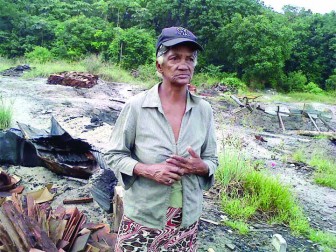Sixty-eight-year-old Dahlia Lewis or Auntie Pauline as she is known to her relatives and friends is an amiable and unpretentious woman who values much more the independence of her self-employment than the title of ‘Woman in Business’ which we choose to ascribe to her. She is the grande dame of the coal-mining women of Yarowkabra, having begun baking and selling coal in 2000.
Yarowkabra is a community of around 400 people most of whom engage in some form of subsistence labour to make ends meet. Subsistence farming predominates and there is little if any regular paid employment here. Dahlia Lewis must work if she is to live and baking coal, she believes, is her best option.

The mother of four and grandmother of 30 had already established her own small enterprise by the time other women in the community decided to set up the Yarowkabra Coal Burning Association. Her position as Vice President of the association is as much as anything else an indication of the recognition she has earned as a veteran coal burner.
Currently she owns and operates three pits, though her advanced years inhibit her ability to move material from the waste wood site at which it is deposited to her pits. She must wait for a truck to unload waste material about 10 yards from her pits and this occurs weekly rather than daily. The circumstance places a brake on her operations but she is philosophical about the problem. It is a a matter of “making do,” she says.
Even the short journey from where the truck deposits the wood to the pits is demanding. She must meet those labour costs and that further reduces her takings. Still, Auntie Pauline isn’t complaining. A 40-pound bag of coal fetches $900 and each pit may yield between 50 and 100 bags of coal.
Like the other women who burn coal at Yarowkabra her operation feeds off the wood waste offered at no cost by the neighbouring Howard Bulkan’s Superior Shingles operation. After she moved to the front of Yarowkabra in 2000 it was a man named “Chinee”, she says, who drew her attention to the economic opportunity.
In an ideal world Auntie Pauline should be retired. At 68 she is far from robust. But hers is not an ideal world. She is part of a family structure in which the senior members take responsibility for the younger ones. Burning coal is her way of helping to support her grandchildren. She wants to help see them through school since, she says, “education is important.”
Like the other women comprising the association she too says that if the collective venture is to survive it would need an infusion of external support. As much as the other individual operations, hers is a threadbare venture. The needs include cutlasses, rakes, shovels, wheelbarrows and safety boots. The potential may be there but for the moment her own business, as much as the others that comprise the Association, is struggling to sustain itself. Still, she values the independence which her self-employment provides.








